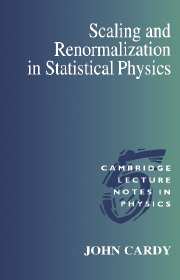Book contents
- Frontmatter
- Dedication
- Contents
- Preface
- 1 Phase transitions in simple Systems
- 2 Mean field theory
- 3 The renormalization group idea
- 4 Phase diagrams and fixed points
- 5 The perturbative renormalization group
- 6 Low dimensional Systems
- 7 Surface critical behaviour
- 8 Random Systems
- 9 Polymer statistics
- 10 Critical dynamics
- 11 Conformal symmetry
- Appendix: Gaussian Integration
- Selected Bibliography
- Index
2 - Mean field theory
Published online by Cambridge University Press: 05 February 2015
- Frontmatter
- Dedication
- Contents
- Preface
- 1 Phase transitions in simple Systems
- 2 Mean field theory
- 3 The renormalization group idea
- 4 Phase diagrams and fixed points
- 5 The perturbative renormalization group
- 6 Low dimensional Systems
- 7 Surface critical behaviour
- 8 Random Systems
- 9 Polymer statistics
- 10 Critical dynamics
- 11 Conformal symmetry
- Appendix: Gaussian Integration
- Selected Bibliography
- Index
Summary
Before embarking on an exploration of the modern theories of critical behaviour, it is wise to consider first the more traditional approaches, generally lumped together under the heading of mean field theory. Despite the fact that such methods generally fail sufficiently close to the critical point, there are nonetheless several good reasons for their study. Mean field theory is relatively simple to apply in most cases, and often gives a qualitatively correct picture of the phase diagram of a given model. In some cases, where fluctuation effects are suppressed for some physical reason, its predictions are also quantitatively accurate. In a sufficiently large number of spatial dimensions, it gives exact values for the various critical exponents. Moreover, it often serves as an important adjunct to the renormalization group, since the latter by itself may give direct information about the existence and location of phase transitions, but not about the nature of the phases which they separate. For this, further input is necessary, and this often may be provided by applying mean field theory in a region of the phase diagram far from the critical region, where it is applicable.
The mean field free energy
There are as many derivations of the basic equations of mean field theory as there are books written on the subject, all of varying degrees of rigour and completeness.
Information
- Type
- Chapter
- Information
- Scaling and Renormalization in Statistical Physics , pp. 16 - 27Publisher: Cambridge University PressPrint publication year: 1996
